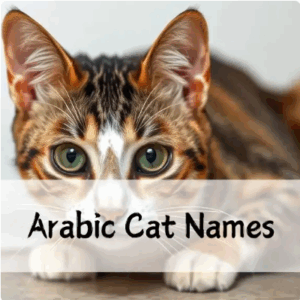The bond between humans and felines transcends cultural boundaries, with cats holding a special place in homes and hearts across the globe. From ancient Egypt, where they were revered as deities, to the bustling souks of Marrakech, where they freely roam, cats have long been cherished companions. When it comes to naming these enigmatic creatures, many seek something more than just a label – a name that carries meaning, echoes a rich heritage, or simply sounds beautiful. Enter Arabic cat names, a burgeoning trend that offers a captivating blend of history, poetry, and exotic charm. This article delves into the enchanting world of Arabic cat names nomenclature for felines, exploring its diverse origins, cultural significance, and providing an extensive compendium of names suitable for every purr-fect personality.

Arabic Cat Names
Arabic Cat Names: An Introduction
In a world increasingly connected, the desire to embrace diverse cultural elements in our daily lives has grown. For pet owners, this translates into a fascinating exploration of names that transcend the familiar. Arabic cat names, with their lyrical sounds and profound meanings, offer an appealing alternative to conventional choices. These names are not merely exotic; they are steeped in a language renowned for its poetic beauty, its historical depth, and its association with a vibrant civilization that has contributed immensely to art, science, and philosophy. Whether you’re drawn to the romantic allure of names like “Layla,” the strength of “Omar,” or the gentle charm of “Zuzu,” Arabic names provide a unique identity that speaks volumes about your feline friend and your appreciation for global heritage.
The Enduring Allure of Arabic Names for Cats
The fascination with Arabic names for felines stems from multiple sources. Firstly, the phonetic beauty of the Arabic language lends itself wonderfully to pet names. Many Arabic words possess a fluidity and softness that are pleasing to the ear, making them delightful to call out to a beloved cat. Secondly, the rich cultural associations are a significant draw. Arabic names often carry deep meanings, referencing virtues, natural elements, historical figures, or even celestial bodies. This allows owners to choose a name that truly resonates with their cat’s personality, appearance, or the sentiment they wish to convey. Furthermore, the rising global interest in Middle Eastern culture, driven by media, travel, and culinary arts, has naturally extended to pet naming, offering a touch of the exotic and unique that stands out in a crowd of common monikers.
The Rich Tapestry of Arabic Language and Culture
To truly appreciate Arabic cat names, one must acknowledge the vastness and richness of the Arabic language and the cultures it encompasses. Arabic is a Semitic language, spoken by hundreds of millions across the Middle East and North Africa. It is the liturgical language of Islam, holding immense spiritual significance. Beyond its religious importance, Arabic is a language of poetry, storytelling, and intricate calligraphy. Its vocabulary is expansive, with nuances and synonyms that allow for highly descriptive and evocative naming. The Arab world itself is a mosaic of diverse nations, each with its unique dialects and cultural expressions, yet all united by the thread of the Arabic tongue. This linguistic and cultural depth means that an Arabic cat name is not just a sound; it’s a small piece of a grand narrative, carrying with it echoes of ancient civilizations, vibrant markets, and timeless desert landscapes.
Male Arabic Cat Names
Male Arabic cat names often convey strength, nobility, wisdom, or a connection to nature. They can range from classic and widely recognized names to more unique and historical options, each with its own charm and significance. These names often have a robust sound, perfect for a strong or adventurous tomcat.
- Amir (أمير): Meaning “prince” or “commander,” ideal for a regal and dignified male cat.
- Omar (عمر): A timeless classic, meaning “long-lived” or “flourishing.”
- Khalid (خالد): Meaning “eternal” or “immortal,” a powerful choice.
- Jamal (جمال): Meaning “beauty,” suitable for a strikingly handsome cat.
- Fahad (فهد): Meaning “cheetah,” perfect for a fast and agile feline.
- Samir (سمير): Meaning “companion in evening talk,” for a friendly, chatty cat.
- Zayn (زين): Meaning “beauty” or “grace,” a modern and popular choice.
- Rami (رامي): Meaning “archer” or “lover,” for a playful and active cat.
- Malik (مالك): Meaning “king” or “owner,” for a cat who rules the household.
- Nasser (ناصر): Meaning “victorious” or “supporter.”
- Kareem (كريم): Meaning “generous” or “noble.”
- Tariq (طارق): Meaning “morning star” or “he who knocks at the door.”
- Sultan (سلطان): Meaning “ruler” or “authority.”
- Farid (فريد): Meaning “unique” or “precious.”
- Hassan (حسن): Meaning “handsome” or “good.”
Female Arabic Cat Names
Female Arabic cat names are often celebrated for their lyrical quality and beautiful meanings, frequently associated with flowers, stars, precious gems, or virtues. They evoke elegance, grace, and sometimes a touch of mystique, fitting for the discerning female feline.
- Layla (ليلى): Meaning “night,” a classic and romantic choice for a dark-furred cat.
- Yasmin (ياسمين): Meaning “jasmine flower,” for a sweet and delicate cat.
- Zahra (زهرة): Meaning “flower” or “blossom,” a popular and pretty name.
- Aisha (عائشة): Meaning “living” or “prosperous,” a classic and widely beloved name.
- Nala (نالا): Though popularized by “The Lion King,” it has Arabic roots meaning “gift.”
- Samira (سميرة): Meaning “companion in evening talk,” the feminine form of Samir.
- Farah (فرح): Meaning “joy” or “happiness,” for a cheerful cat.
- Hana (هنا): Meaning “happiness” or “bliss.”
- Nour (نور): Meaning “light,” perfect for a cat that brightens your life.
- Amira (أميرة): Meaning “princess,” the feminine form of Amir.
- Safiya (صفية): Meaning “pure” or “sincere friend.”
- Zaina (زينة): Meaning “beauty” or “adornment.”
- Leila (ليلى): An alternative spelling of Layla, meaning “night.”
- Zara (زارا): Meaning “princess” or “radiance.”
- Salma (سلمى): Meaning “safe” or “peaceful.”
Cute Arabic Cat Names
For the irresistibly adorable feline, cute Arabic names often feature soft sounds, diminutive forms, or meanings associated with sweetness and charm. These names are perfect for kittens or cats with an endearing, playful personality.
- Zuzu (زوزو): A playful and affectionate name, often used as a diminutive.
- Kiki (كيكي): A cute and informal name, popular for small, playful cats.
- Mimi (ميمي): A universally cute name, often used for cats.
- Habibi (حبيبي): Meaning “my darling” or “my love,” a term of endearment.
- Fifi (فيفي): A sweet and dainty name.
- Lulu (لولو): Meaning “pearl,” a precious and cute name.
- Didi (ديدي): A simple, cute, and easy-to-call name.
- Booboo (بوبو): A playful, affectionate term.
- Shushu (شوشو): A soft and cute sounding name.
- Toto (توتو): A fun and energetic name.
Funny Arabic Cat Names
Sometimes, a cat’s quirky personality demands a name with a touch of humor. Funny Arabic names can be derived from words that sound amusing, or those that have an ironic or playful meaning when applied to a feline.
- Foul (فول): Meaning “beans,” a surprisingly common and endearing nickname in some Arab cultures, can be funny for a chubby cat.
- Batata (بطاطا): Meaning “potato,” for a round or lazy cat.
- Shawarma (شاورما): The popular Middle Eastern dish, a quirky and recognizable name.
- Fustuq (فستق): Meaning “pistachio,” a fun name for a green-eyed cat.
- Bazooka (بازوكا): A strong, humorous name for a tiny cat.
- Baba Ghanoush (بابا غنوج): Another well-known dish, for a cat with a creamy or dark coat.
- Mishmish (مشمش): Meaning “apricot,” a soft and somewhat silly name.
- Bukra (بكرة): Meaning “tomorrow,” for a cat who’s always procrastinating.
- Fawzi (فوزي): Meaning “victorious,” can be funny if the cat is clumsy or a failure at hunting.
- Zghir (صغير): Meaning “small,” for a surprisingly large cat.
Good Arabic Cat Names
“Good” Arabic cat names encompass a broad category of names that are universally appealing, easy to pronounce, and carry positive connotations. These are reliable choices that sound pleasant and are well-received.
Unique Arabic Cat Names
For those seeking a name that stands out from the crowd, unique Arabic cat names often delve into less common words, ancient names, or names with particularly distinctive sounds or meanings. These names are perfect for a cat with a truly individual personality.
- Aziz (عزيز): Meaning “powerful,” “cherished,” or “rare.”
- Caspian (قزوين): Referring to the Caspian Sea, a grand and unique geographical name.
- Dalia (دالية): Meaning “grapevine” or “flower,” less common than Zahra.
- Faris (فارس): Meaning “knight” or “horseman,” for a noble and brave cat.
- Izhar (إزهار): Meaning “blossom” or “revelation.”
- Jinan (جنان): Meaning “gardens” or “paradise,” a beautiful and ethereal name.
- Kaito (كايتو): Though Japanese, it sounds similar to some Arabic sounds, and can be unique if a unique Arabic-like sound is desired. Self-correction: While it sounds similar, Kaito is distinctly Japanese and might not fit the “Arabic” criteria for uniqueness. Let’s offer a more authentically unique Arabic name.
- Jawhar (جوهر): Meaning “essence” or “jewel,” for a truly precious cat.
- Liyan (ليان): Meaning “softness,” “tenderness.”
- Mahdi (مهدي): Meaning “guided one.”
- Qamar (قمر): Meaning “moon,” a poetic and less common alternative to “Luna.”
- Rima (ريما): Meaning “white antelope,” graceful and unique.
- Siraj (سراج): Meaning “lamp” or “light,” for a cat that illuminates your life.
- Thuraya (ثريا): Meaning “Pleiades (star cluster),” a celestial and beautiful name.
- Warda (وردة): Meaning “rose,” elegant and timeless.
Unique Arabic Cat Names for Girls
Beyond the popular Layla and Zahra, there are many enchanting and unique Arabic names for female cats that possess beautiful meanings and a distinct lyrical quality.
- Alia (عالية): Meaning “exalted” or “sublime.”
- Basma (بسمة): Meaning “smile,” for a happy cat.
- Dunya (دنيا): Meaning “world,” a profound and unique choice.
- Falak (فلك): Meaning “celestial orbit” or “sky,” mystical and beautiful.
- Ghina (غنى): Meaning “melody” or “wealth.”
- Jumana (جمانة): Meaning “silver pearl,” precious and delicate.
- Khadija (خديجة): A classic and respected name, for a dignified cat.
- Lamar (لمار): Meaning “liquid gold” or “sparkle.”
- Mayssa (ميساء): Meaning “graceful walk” or “swaying.”
- Nasma (نسمة): Meaning “breeze” or “gentle wind.”
- **Raneem (رنيم): ** Meaning “singing” or “melodious sound.”
- Salwa (سلوى): Meaning “comfort” or “quail,” a gentle name.
- Tahira (طاهرة): Meaning “pure” or “chaste.”
- Yasra (يسرى): Meaning “prosperous” or “ease.”
- Zaina (زينة): An alternative spelling of Zayna, meaning “beauty.”
Unique Arabic Cat Names for Boys
For male cats, choosing a unique Arabic name can highlight a distinctive personality or appearance. These names often have a strong sound and meaningful origins that set them apart.
- Adnan (عدنان): An ancient and noble name, often associated with a progenitor of the Arabs.
- Badi (بديع): Meaning “wonder” or “marvelous.”
- Fadi (فادي): Meaning “redeemer” or “savior.”
- Ghazi (غازي): Meaning “conqueror” or “raider.”
- Hatem (حاتم): Meaning “decisive” or “judge.”
- Iyad (إياد): Meaning “support” or “strength.”
- Jibran (جبران): After the famous poet Kahlil Gibran, meaning “to mend.”
- Kais (قيس): An ancient Arabic name, meaning “firmness” or “measure.”
- Lamees (لميس): Though typically female, can be unique for a male, meaning “soft to the touch.” Self-correction: Lamees is almost exclusively female in Arabic. Let’s offer a more fitting male unique name.
- Laith (ليث): Meaning “lion,” a powerful and distinct choice.
- Mazen (مازن): Meaning “rain clouds” or “glowing face.”
- Nawfal (نوفل): Meaning “generous” or “sea.”
- Qais (قيس): A classical name associated with legendary lovers.
- Rakan (راكان): Meaning “pillar” or “support.”
- Sameer (سمير): An alternative spelling of Samir, meaning “companion in evening talk.”
- Taym (تيم): Meaning “servant of God,” a short and strong name.
- Zayd (زيد): Meaning “growth” or “abundance.”
Arabic Cat Names Male
This section reiterates and expands upon the earlier male names, providing a more extensive list for comprehensive Browse.
- Adel (عادل): Just, fair.
- Ahmed (أحمد): Highly praised, commendable.
- Ali (علي): Noble, exalted.
- Anas (أنس): Friend, companion.
- Bader (بدر): Full moon.
- Bashir (بشير): Bearer of good news.
- Bilal (بلال): Refreshment, water.
- Essam (عصام): Safeguard, protection.
- Faisal (فيصل): Decisive, arbiter.
- Hamza (حمزة): Strong, steadfast.
- Hassan (حسن): Handsome, good.
- Hisham (هشام): Generosity.
- Hussein (حسين): Good, handsome (diminutive of Hassan).
- Ibrahim (إبراهيم): Father of multitudes (Abraham).
- Imran (عمران): Prosperity, long life.
- Jaber (جابر): Comforter, healer.
- Jalal (جلال): Greatness, glory.
- Kamal (كمال): Perfection, completeness.
- Karim (كريم): Generous, noble.
- Khaled (خالد): Eternal, immortal.
- Majid (ماجد): Glorious, noble.
- Mousa (موسى): Moses.
- Mustafa (مصطفى): Chosen, selected.
- Nabil (نبيل): Noble, honorable.
- Osama (أسامة): Lion.
- Rashid (رشيد): Rightly guided.
- Reda (رضا): Contentment, satisfaction.
- Saad (سعد): Good fortune, happiness.
- Salem (سالم): Safe, healthy.
- Tariq (طارق): Morning star.
- Walid (وليد): Newborn child.
- Yahya (يحيى): John.
- Youssef (يوسف): Joseph.
- Ziyad (زياد): Growth, increase.
Arabic Cat Names Female
This section offers an expanded list of beautiful and meaningful Arabic names for female cats.
- Aaliyah (عالية): Exalted, sublime.
- Afra (عفراء): White, pure.
- Ahlam (أحلام): Dreams.
- Amal (أمل): Hope.
- Anisa (أنيسة): Friendly, amiable.
- Arwa (أروى): Graceful, satisfied.
- Asma (أسماء): Names, exalted.
- Batool (بتول): Ascetic virgin.
- Dina (دينا): Judgment (also a short form of many names).
- Fatima (فاطمة): Captivating, shining.
- Hala (هالة): Halo around the moon.
- Huda (هدى): Guidance.
- Inaya (عناية): Care, concern.
- Janna (جنة): Garden, paradise.
- Khadija (خديجة): Respected historical name.
- Laila (ليلى): Night.
- Latifa (لطيفة): Gentle, kind.
- Mona (منى): Wishes, desires.
- Nadia (نادية): Caller, announcer.
- Najla (نجلاء): Having large, beautiful eyes.
- Noura (نورة): Light.
- Rana (رنا): Gaze, charm.
- Reem (ريم): White antelope.
- Sabrina (صبرينة): Patience (Arabic form of Latin name).
- Sahar (سحر): Dawn, magic.
- Sakinah (سكينة): Tranquility, peace.
- Samar (سمر): Evening talk.
- Shatha (شذى): Aroma, fragrance.
- Siham (سهام): Arrows.
- Soumaya (سمية): High above.
- Thuraya (ثريا): Pleiades (star cluster).
- Yasmine (ياسمين): Jasmine flower.
- Zahira (زاهرة): Shining, radiant.
- Zeina (زينة): Beauty, adornment.
Muslim Cat Names
For many, the term “Arabic cat names” naturally extends to “Muslim cat names,” given the deep intertwining of the Arabic language with Islamic culture and faith. These names often come from Islamic history, the Quran, or embody virtues cherished in Islam. Many names listed in previous sections are inherently Muslim.
- Adnan: (As above)
- Aisha: (As above) Wife of Prophet Muhammad (PBUH), renowned for her intelligence and warmth.
- Ali: (As above) Fourth Caliph, known for bravery and wisdom.
- Fatima: (As above) Daughter of Prophet Muhammad (PBUH), revered for purity and devotion.
- Hassan: (As above) Grandson of Prophet Muhammad (PBUH).
- Hussein: (As above) Grandson of Prophet Muhammad (PBUH).
- Ibrahim: (As above) Prophet Abraham.
- Iman (إيمان): Meaning “faith” or “belief.”
- Jannah (جنة): Meaning “paradise” or “garden.”
- Khalifa (خليفة): Meaning “successor” or “caliph.”
- Maryam (مريم): Mary, mother of Jesus (PBUH), highly revered in Islam.
- Muhammad (محمد): The name of the Prophet of Islam (PBUH), often shortened to “Hamad” or “Momo” for pets to show respect.
- Mustafa: (As above) An epithet of Prophet Muhammad (PBUH).
- Omar: (As above) Second Caliph, known for justice and leadership.
- Salah (صلاح): Meaning “righteousness” or “goodness.”
- Sultan: (As above)
- Yusuf (يوسف): Prophet Joseph.
- Zaynab (زينب): Daughter of Prophet Muhammad (PBUH).
Urdu Names for Cats
While distinct from Arabic, Urdu is an Indo-Aryan language heavily influenced by Arabic, Persian, and Turkish. Many Urdu names, therefore, share roots or sound similar to Arabic names, making them a natural extension for those seeking names with an Eastern flair.
- Aftab (آفتاب): Meaning “sun,” from Persian but common in Urdu.
- Gul (گل): Meaning “flower” or “rose,” from Persian but widely used in Urdu.
- Jaan (جان): Meaning “life” or “soul,” a term of endearment.
- Sher (شیر): Meaning “lion” or “tiger,” for a brave or majestic cat.
- Meher (مہر): Meaning “sun” or “affection.”
- Noor (نور): (As above, common in both Arabic and Urdu).
- Parveen (پروین): Meaning “Pleiades (star cluster),” from Persian, common in Urdu.
- Rani (رانی): Meaning “queen,” from Sanskrit, common in Urdu.
- Shah (شاہ): Meaning “king,” from Persian, common in Urdu.
- Zara (زارا): (As above, popular in both Arabic and Urdu).
- Zoya (زویا): Meaning “life” or “alive,” from Persian, common in Urdu.
Islamic Cat Names: Faith and Feline Companionship
Islamic tradition holds cats in high regard, viewing them as clean and beloved animals. Prophet Muhammad (PBUH) himself was known for his affection for cats, particularly his cat Muezza. This reverence makes Islamic cat names a meaningful choice for Muslim pet owners or anyone who appreciates this cultural aspect. These names often embody virtues, reflect significant figures, or refer to concepts important in Islam.
- Muezza (معزة): The name of Prophet Muhammad’s (PBUH) cat, a deeply significant and affectionate choice for any cat.
- Sadiq (صادق): Meaning “truthful” or “sincere.”
- Rahim (رحيم): Meaning “merciful” or “compassionate.”
- Amin (أمين): Meaning “trustworthy” or “faithful.”
- Barakah (بركة): Meaning “blessing” or “divine grace.”
- Hafiz (حافظ): Meaning “guardian” or “protector.”
- Noor Al-Ain (نور العين): Meaning “light of the eye,” a term of endearment.
- Falah (فلاح): Meaning “success” or “salvation.”
- Jameel (جميل): Meaning “beautiful” (male).
- Jameela (جميلة): Meaning “beautiful” (female).
- Wafa (وفاء): Meaning “loyalty” or “faithfulness.”
- Zikr (ذكر): Meaning “remembrance (of God).”
Choosing the Perfect Arabic Name for Your Cat
Selecting the ideal Arabic name for your beloved feline companion is a delightful process that combines personal preference with practical considerations. Here are some tips to guide you:
- Observe Your Cat’s Personality: Does your cat purr constantly (Farah – “joy”)? Is it a skilled hunter (Fahad – “cheetah”)? Is it strikingly beautiful (Jamal – “beauty”)? Let their unique traits guide your choice.
- Consider Their Appearance: A white cat might suit “Layla” (night, for contrast) or “Nour” (light). A golden cat could be “Zara” (radiance). A large, dignified cat might be “Sultan” or “Amira.”
- Pronunciation and Recall: Choose a name that is easy for you and your family to pronounce consistently. Cats respond best to names that are one or two syllables, or those with clear, distinct sounds. Say the name aloud several times to ensure it feels natural.
- Meaning Matters (to You): While your cat won’t understand the literal meaning, knowing the significance behind the name can deepen your connection to your pet. Pick a meaning that resonates with you and your feelings for your cat.
- Test It Out: Before committing, try calling your cat by the potential new name for a day or two. See how they respond, and how comfortable you feel using it.
- Avoid Similar-Sounding Names: If you have multiple pets, ensure their names don’t sound too similar to avoid confusion.
- Embrace Uniqueness or Classic Appeal: Decide if you want a widely recognizable Arabic name or something more rare and distinctive. Both have their charm.
The Global Appeal of Arabic Cat Names
The growing popularity of Arabic cat names is a testament to the interconnectedness of our modern world. As cultures intertwine and global awareness expands, so too does our appreciation for beauty and meaning found in diverse languages. Arabic names for cats are not just a trend; they represent a desire to honor cultural heritage, to embrace linguistic richness, and to bestow a name upon a beloved companion that is both beautiful to the ear and meaningful to the heart. They offer a unique avenue for pet owners to express their individuality and their appreciation for the vast, vibrant tapestry of human civilization, all wrapped up in the charming purr of a feline friend. This global appeal reflects a broader movement towards celebrating diversity and seeking out names that tell a story, transcending mere labels to become symbols of affection and cultural connection.
Conclusion
Choosing an Arabic name for your cat is an invitation to infuse your daily life with a touch of exotic elegance, profound meaning, and cultural richness. From the powerful sounds of “Amir” and “Layla” to the gentle whispers of “Zuzu” and “Nour,” these names offer a distinct identity for your cherished feline companion. They are not merely names; they are echoes of ancient traditions, poetic beauty, and a deep reverence for animals within the Arabic and Islamic world. By selecting an Arabic name, you are celebrating your cat’s unique spirit while honoring a language and culture renowned for its enduring charm.
Frequently Asked Questions (FAQs)
Q1: Is it respectful to use Arabic names for pets if I’m not of Arabic descent or Muslim? A1: Yes, absolutely! Using names from any culture, including Arabic, for a pet is generally seen as a sign of appreciation and respect for that culture’s language and heritage, provided the name is used with good intent and not in a mocking or disrespectful way. Many beautiful Arabic names have become universally appealing due to their sound and meaning.
Q2: Will my cat respond to an Arabic name? A2: Cats respond to the sound and consistency of their name, regardless of the language. As long as you use the chosen Arabic name consistently and with positive reinforcement, your cat will learn to recognize it, just as they would any other name.
Q3: Are there any Arabic names that are considered inappropriate for pets? A3: Generally, names of Prophets (like Muhammad, Musa, Isa) or highly sacred terms are often considered too revered for pets by some Muslim individuals. However, many other beautiful and common Arabic names are perfectly suitable and widely used. If in doubt, stick to names that are general nouns, adjectives, or common given names that don’t hold extremely high religious significance.
Q4: How do I pronounce Arabic names correctly? A4: Arabic pronunciation can be challenging due to sounds not present in English. Many online resources, like pronunciation guides or Google Translate’s audio feature, can help you hear and practice the correct pronunciation. Focus on the main sounds and syllable stress.
Q5: What if I like an Arabic name but want a simpler nickname? A5: This is a common practice! Many longer Arabic names can be shortened into cute, easily pronounceable nicknames. For example, “Abdullah” could be “Abby,” “Jamal” could be “Jay,” “Layla” could be “Lala,” and “Yasmin” could be “Minnie.”






